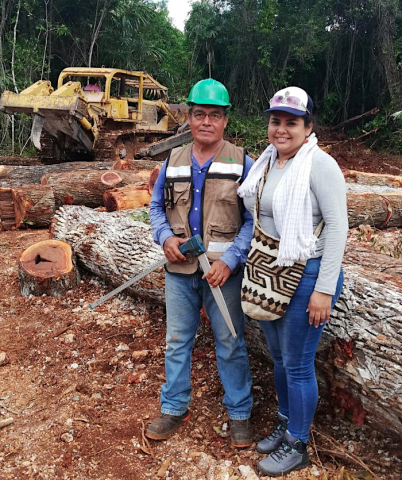Colombians learn from Mexico’s community-based forest management
A delegation of officials and researchers from Caquetá, Colombia traveled recently to the Mexican state of Quintana Roo to learn from successes there in community-based forestry management. The visit comes as Colombia struggles with persistently high rates of deforestation driven by illicit activities including land grabbing, coca cultivation and illegal mining.
The delegation was part of ongoing exchanges between regional governments across the Amazon, Mexico and countries in Central America working to slow deforestation and promote sustainable use of standing forests.

“For me, the highlight of the visit was learning about the ejidos,” said Karina Monroy, a forest engineer working with EII’s team in Caquetá.
A central aspect of Mexico’s forestry management system, ejidos are communal land holdings where resources are governed and distributed among community members. Together they cover two-thirds of Mexico’s forests.
Monroy joined the Colombia delegation for the weeklong workshop which ran through October 25. She said the ejido system has helped the regional government in Quintana Roo establish “a clear set of rules and regulations that have in turn led to an equitable distribution of benefits” for communities that live in and rely on surrounding forests.
She also credited Mexico’s ejidos with fostering the “inclusion of women and youth” in forestry management, and said the system is a valuable model for Caquetá, which is now working to develop its own plan to grow a viable forest economy based on sustainable use of standing forests.
“This is a model that can contribute to current community forestry activities promoted in Caquetá,” she explained, “highlighting the effective implementation of forest management measures and the need for real sustainability and profitability.”
The delegation was led by Caquetá’s Secretary of Agriculture, Lorenzo Vargas and was organized and funded through the Governors Forest and Climate Task Force (GCF).
María Adelaida Fernández-Muñoz oversees EII’s Colombia program, including a project to bring renewable energy to rural Indigenous communities in Caquetá. She says having officials from the Ministry of Agriculture there is significant because “they are the ones who can effectively promote these ideas in Caquetá and turn them into economic opportunities.”
Colombia saw a 10% decrease in deforestation rates in 2018 compared to a year earlier, though the amount of forest loss – 198,000 hectares – was nearly 60% greater than in 2015, one year prior to a peace agreement with the rebel group FARC.
Deforestation rates in Colombia soared after the peace deal was signed as armed groups and landowners moved in to regions once controlled by rebel forces, which maintained their own environmental regulations.
Fernández-Muñoz says Colombia is still relatively weak when it comes to helping communities derive benefits from standing forests. She points to a jumble of regulatory hurdles and geographic barriers as reasons for that.
“It is impossible for us to stop deforestation if people living near forests can’t use them sustainably,” she said. “This is a key issue.”
She added that Mexico and countries in Central America have been very good at this. “We are hoping to learn more from them to make it a reality in Colombia.”
